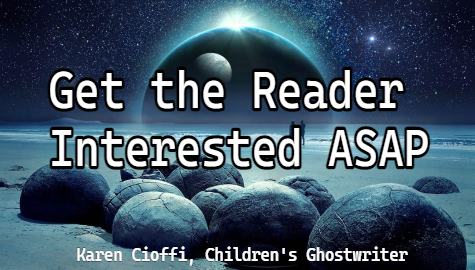You may have an out-of-the-ballpark manuscript, but if you don’t get the reader interested within the first sentence or paragraph, you may lose that reader. Those first sentences are so important, Jacob M. Appel (author of over two hundred published short stories) notes, “agents and editors, if not impressed after a sentence or two, will read no further.” So, what are some strategies to get the reader’s interest peaked at the get-go? 1. The first sentence should offer a distinctive voice and introduce the main character (MC). It might also provide the setting and needs to grab the reader. In the chapter book fantasy, Walking Through Walls, the first sentence lets the reader know who the main character is, and based on his name, it helps establish the culture. It also establishes the setting and brings in sensory details: “Wang bound the last bunch of wheat stalks as the sun beat down on the field.” 2. Within the first paragraph, the conflict and setting should be established. It should also convey the point of view (POV). This is especially important when writing for children. The rest of the paragraph continues: “Sweat poured from the back of his neck drenching the cotton shirt he wore. I hate doing this work. He hurled the bundles on a cart. ‘Father, the bales are stacked. I am going home; it is too hot.’” This first sentence shows the conflict and POV. The language also sets the tone of the story. The dialogue has no contractions as it’s set in 16th century China, giving a specific flavor to the story. If the paragraphs are short, the grabbing can continue into the second paragraph. 3. The second paragraph of Walking Through Walls sets the main character’s POV/character: “Twelve-year-old Wang longed to be an Eternal. He craved wealth… and power. Spending his time learning about these mystics took his thoughts away from the certain fate of slaving in the wheat fields all his life, like his father.” The reader now knows Wang’s age and his desire to become an Eternal in order to gain wealth and power. He does NOT want to follow in his father’s footsteps. The plot is set. In under 100 words, the reader has all she needs to know, and hopefully, it’s enough for her to want to go with Wang on his journey to become an Eternal. Summing it up. The opening of your story is the portal into the world within the pages of your book. If those pages are grabbing enough, you’ve hooked a reader to the end. An article on Masterclass advises: “Consider the central theme of your story idea and brainstorm ways to distill it down to a single sentence.” That can be your opening sentence. Here are a few famous first sentences: Call me Ishmael. (Moby Dick by Herman Melville) It was bright cold day in April, and the clocks were striking thirteen. (Nineteen Eighty-Four by George Orwell) All happy families are alike; each unhappy family is unhappy in its own way. (Anna Karenina by Leo Tolstoy) Mr. and Mrs. Dursely of number four, Privet Drive, were proud to say that they were perfectly normal, thank you very much. (Harry Potter and the Philosopher’s Stone by J.K. Rowling) It was the best of times, it was the worst of times, it was the age of wisdom, it was the age of foolishness... (A Tale of Two Cities by Charles Dickens) All children, except one, grow up. (Peter Pan by J.M. Barrie) In a hole in the ground there lived a hobbit. (The Hobbit by J.R.R. Tolkien) "Where's Papa going with that ax?" said Fern to her mother as they were setting the table for breakfast. (Charlotte's Web by E.B. White) There was no possibility of taking a walk that day. (Jane Eyre by Charlotte Bronte) When he was nearly thirteen, my brother Jem got his arm badly broken at the elbow. (To Kill A Mockingbird by Harper Lee) In our family, there was no clear line between religion and fly-fishing. (A River Runs Through It by Norman Maclean) Under certain circumstance there are few hours in life more agreeable than the hour dedicated to the ceremony known as afternoon tea. (The Portrait Of A Lady by Henry James)
I’m a working children’s ghostwriter, rewriter, and coach. I can help turn your story into a book you’ll be proud to be author of, one that’s publishable and marketable. Contact me at: kcioffiventrice@gmail.com. Or, you can give me a call at 834---347---6700 Or, if you’d rather do-it-yourself, check out my book, How to Write a Children’s Fiction Book.
What exactly does it mean to show rather than tell in your writing? Tips to Overcome Writing Procrastination Children’s Writing and Information Dump



